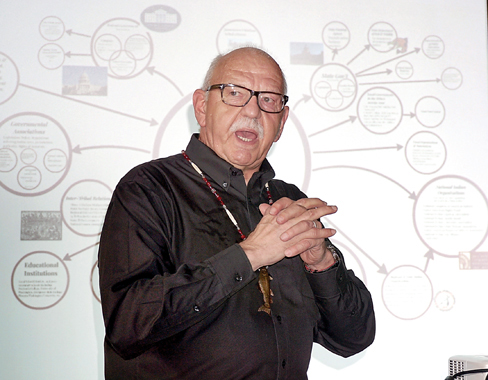PORT TOWNSEND — The interaction between tribal, federal and state governments is a delicate process, and tribal leaders also need to focus on self-reliance, the chairman of the Jamestown S’Klallam tribe said Tuesday.
“We deal with issues that represent everything, from local to national,” said Chairman Ron Allen to a Port Townsend Rotary Club audience of about 50 people in Fort Worden Commons.
“We need to know which governments we need to approach in order to pass legislation and maintain good relationships with each one.”
Allen, 68, has served as tribal chairman since 1977.
Allen said most people outside of the tribe “don’t understand how complex our world is, with many intersecting relationships.”
Allen said the tribe has recategorized itself, identifying as citizens rather than members.
“We are not an association, we are not an organization; we are actually a government,” Allen said.
“We are responsible for our citizens and all the people around them.”
The Jamestown S’Klallam tribe has about 600 citizens, “with half of them in Jefferson and Clallam counties and the rest all over the place,” Allen said.
He said the tribe’s governmental functions include executive operations, social and community services, education, health care, job opportunities and drug rehabilitation programs.
These programs are started for the benefit of tribal citizens but grow into diversified businesses that make the tribe more self-reliant, Allen said.
He said the tribe has connections to dozens of local, state and federal agencies, including Congress, the state Legislature, gaming authorities, the Department of Natural Resources and courts.
“Our lives are not boring,” Allen said of the tribe’s leadership. “It’s like being in the fast lane with no exit ramp.”
While lobbying for legislation, Allen often flies to Washington, D.C., for a meeting, then turns around and flies back to Washington state.
Partnerships with local agencies are important, such as the agreement between the tribe and the Clallam County Sheriff’s Office to charge those arrested on tribal land with violations of tribal law.
The tribe, he said, is “too small to provide our own law enforcement.”
Allen said other governments won’t bail the tribes out; they are on their own.
After his presentation, Allen said tribal leadership needs to be more self-reliant.
“The needs of the tribes and the communities are overwhelming,” he said after his presentation.
“You will never get the resources from the state government or the federal government. They have so many priorities that they can’t go there for the tribes and solve these problems.”
The tribes, Allen said, need to stop depending on others to fill their needs.
“The tribes need to be looking for ways to be more self-reliant and focus on ways to move from dependency on other governments, building their own capacities to diversify and create more unrestricted revenue,” he said.
Allen said older generations have passed on the notion that the government has an obligation and a duty to support the tribes because of historical atrocities and injustices.
“If you keep pounding on that, you aren’t going to get anywhere,” he said.
“You need to think outside the circle, and the leadership needs to turn away from the demands and expectations of past generations.”
_________
Jefferson County Editor Charlie Bermant can be reached at 360-385-2335 or cbermant@peninsuladailynews.com.
